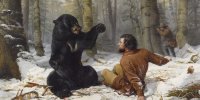- Joined
- May 2, 2001
- Messages
- 7,526
I really enjoy reading thriller and mystery non-fiction. Years ago more of my reading was non-fiction. But in recent years the ratios have flipped.
I'll read about 100 books per year. I check out and discard quite a few beyond that 100 number without completing many others after I start them. Mostly digital, some hard cover. My digital books come through an app called LIBBY. Once installed you can use it through your local library card to gain access to an incredible array of good reading material...at no cost.
I'll guess that some of you have read parts or all of the Swagger, sniper novels written by Stephen Hunter. I just completed his TIME TO HUNT story. Set in Viet Nam War and in western US mountains.
Bob Lee Swagger Series - click on following links to read plot summary
Earl Swagger Series
Really great series.
I love this website for identification of ALL books by an author in a certain chronological order...and then trying to read them in order if possible.

Currently I have 35 books on hold (one week to six months) or reserve status with either my local library (hard cover) or Libby (digital text - - - or audio - for long drives - or in a tent at night in the wilderness)
Current authors on my lists include:
Dean Koontz
Stephen Hunter
Patricia Cornwell
Brad Thor
John Sanford
Johnathan Kellerman
Catherine Coulter
Harlen Coban
James Patterson
Craig Johnson
C.J. Box
David Baldacci
Daniel Silva
John Grisham
What do you like to read?
I'll read about 100 books per year. I check out and discard quite a few beyond that 100 number without completing many others after I start them. Mostly digital, some hard cover. My digital books come through an app called LIBBY. Once installed you can use it through your local library card to gain access to an incredible array of good reading material...at no cost.
I'll guess that some of you have read parts or all of the Swagger, sniper novels written by Stephen Hunter. I just completed his TIME TO HUNT story. Set in Viet Nam War and in western US mountains.
Bob Lee Swagger Series - click on following links to read plot summary
- Point of Impact, 1993
- Black Light, 1996
- Time to Hunt, 1998
- The 47th Samurai, 2007
- Night of Thunder, 2008
- I, Sniper, 2009
- Dead Zero, 2010
- The Third Bullet, 2013
- Sniper's Honor, 2014
- G-Man, 2017
- Game of Snipers, 2019
Earl Swagger Series
- Hot Springs, 2000
- Pale Horse Coming, 2001
- Havana, 2003
Really great series.
I love this website for identification of ALL books by an author in a certain chronological order...and then trying to read them in order if possible.

Currently I have 35 books on hold (one week to six months) or reserve status with either my local library (hard cover) or Libby (digital text - - - or audio - for long drives - or in a tent at night in the wilderness)
Current authors on my lists include:
Dean Koontz
Stephen Hunter
Patricia Cornwell
Brad Thor
John Sanford
Johnathan Kellerman
Catherine Coulter
Harlen Coban
James Patterson
Craig Johnson
C.J. Box
David Baldacci
Daniel Silva
John Grisham
What do you like to read?

